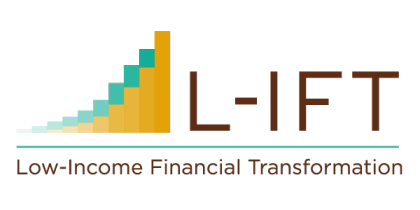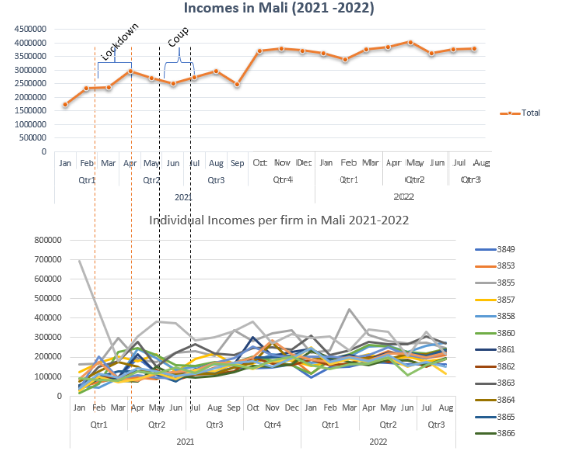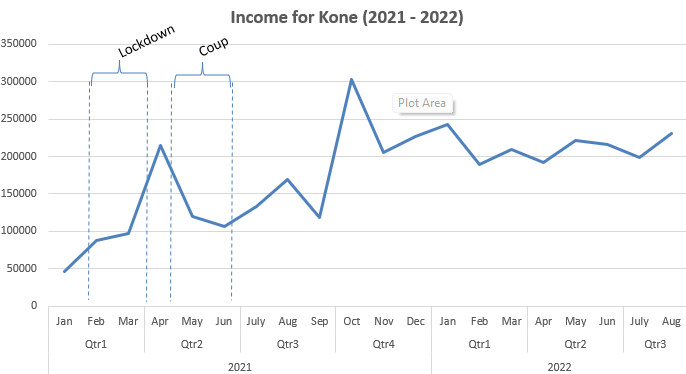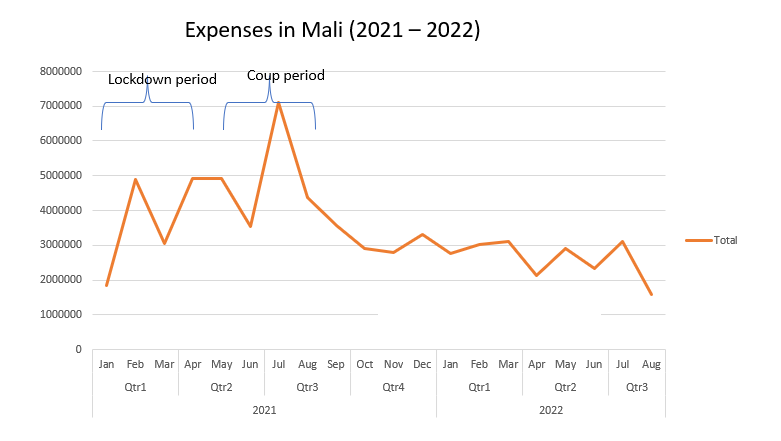Facing uncertain times: Corner shop project diarist, Kone Idrissa1, shares his story and experience operating a small business in Mali during Covid-19 and a wave of political instability.
Kone is a 33-year-old participant in the corner shop diaries project in Mali. The corner shop diaries research project was conceptualized by L-IFT at a time when the Covid-19 pandemic had started to unfold. The objective of the corner shop diaries research is to understand how micro-businesses like corner shops cope with the pandemic, how they recover over time, and how the neighborhoods of these corner shops respond to the crisis. Kone shares his story with us and particularly how his business has gone through the Covid-19 pandemic in addition to other stresses that small enterprises face in Mali. Despite the stresses being faced, he accounts how he has survived and his hopes for business in his country and for himself. He shares important learnings about survival and opportunities that are available to help small businesses thrive.
I am Kone Idrissa. I have been participating in the Corner Shop project since January 2021. Originally from the Ségou Region and the eldest of a family of six children, I moved to Bamako in 2010 to study at university. At the time, it was the only city in Mali that had a university. To make both ends meet and have resources to cover my expenses, I used to go to my uncle’s shop selling spare parts for motorcycles. Over time, I learned sales skills and at the same time was doing my studies.
After graduating in Geography, I could not get a job and my responsibilities increased with the death of my father after a long illness. In addition to my wife, my children, and my brother who was in my care, I found myself with my two sisters and my mother, a total of eight people to care for. So I became a street vendor. Since 2021 I have been participating in the Corner Shop project. I am a spare parts seller and a street vendor so I walk around town by motorcycle selling my goods. But with the arrival of the Coronavirus, we have had a lot of problems in our sector, namely the lack of raw material supply with the closure of the borders since our products come mainly from China. But also with the social distancing, we had to queue for hours in front of the shops to buy the goods so I spent most of the day looking for the goods and then I had to go to the city to look for potential buyers and this can affect my income.
In Mali, recruitment in the public service is not frequent, and even less in my field, Geography. To have more luck, you have to take the entrance exam to ENSup (École Normale Supérieure) to become a secondary school teacher, but this exam is only held once a year and the selection process is rigorous. Most often, it is necessary to have relations or acquaintances to be admitted and then get work or to have relations with private schools to get work there.
Other institutions that employ geographers are NGOs, but it is the same: you need to have relations or acquaintances to be introduced. I take all these statements from my personal experience. I have been confronted with these situations on several occasions, so, I’m still a street vendor.
There is usually a high demand for the goods I sell. The most difficult thing is to stock up and find good paying customers. In the morning, I go to the wholesalers to take the parts and I come back in the afternoon to pay the supplier. It often happens that a customer takes parts and sets an appointment for the payment and then fails to honor the appointment while I have to pay the wholesaler who waits to receive his money and not for explanations. When this happens, sometimes it creates a lack of confidence from the suppliers. Even if I pay with cash, I also take some parts on credit. I do it to have more profit since I don’t have enough stocking up funds and I can’t have credit from financial institutions for lack of collateral, for example, land with a title deed without which financial institutions do not grant credit.
What the analyzed data shows:
Only three out of the total of 18 respondents were able to take loans, two from family members and one from a fellow local shop. These have all been paid back. Eight respondents utilized lines of credit from vendors as Kone often does where one takes stock and pays back later after selling. All manage to pay back these short-term lines of credit.
With the decrease of the Covid-19 barrier measures, activities have somewhat resumed, but at the moment the activities are experiencing considerable difficulties with the political situation resulting from successive coups that led to an economic embargo on the country. Rebellion and jihadism also make the security situation tense and disrupt the supply of raw materials.
What the analyzed data shows (Income):
January 2021 starts off slowly as it is the first month of data collection with Mali in a Covid-19 lockdown already. February and March were difficult months for the businesses as the second wave of Covid-19 was taking its toll. In April, business begin to show improvement as vaccinations were now being implemented and Covid-19 restrictions were now being relaxed and there was more activity for the businesses. Additionally, April marked the beginning of Ramadan and saw an increase in incomes due to holiday purchases. In May 2021, there was a coup in Mali and incomes began to dip at the time and only began to rise again after June 2021. Individual income for Kone (see graph below) also follows a very close trend to the aggregate Mali income. 2022 has also not been an easy year with protests for the departure of the French army in Mali frequent and resulting in several suppliers taking precautions and slowing down their activities. It becomes a similar situation to the coup and Covid-19 situation in the preceding year.
What the analyzed data shows (Expenses):
Expenses reveal a pattern where they increase sharply during the first days of the major lockdown and begin to dip during the lockdown. They pick up again once business starts to re-open in April and also because April is Ramadan month, and many people are making holiday purchases then. Expenses spike again during the coup period because of uncertainty in the country. Additionally, in June 2021, with the increase in the prices of products such as oil and cereals, prices of goods went up and businesses show much higher expenses. Expenses gradually drop as the country stabilizes.
Finally, I realize that university life would be for me just a memory that allowed me to learn more about the world because now I recognize myself more as a spare parts seller than as a Geographer. In the coming years, if I manage to make a lot of savings, I would like to open my own shop and import parts myself and not rely on other local suppliers who also just import and resell. Our business is not simple, is about selling motorcycle parts, one of the difficulties is that it is not easy to put too much pressure on customers to pay when very often customers buy on credit and do not repay within the deadline. It is necessary to be tactful to retain customers given the competition and environment we are operating in.
Covid-19 has adversely affected small businesses given the lockdowns and closure of borders. In addition, importers have taken advantage of this situation to raise prices and sometimes create a shortage of products despite government measures and subsidies. In addition to this, there are the added challenges brought about by the unstable political situation of the country which weakens the country. Speaking of financing, retailers have little access to it, because they do not have sufficient guarantees in the eyes of financial institutions. Retailers do not have a stable economy even if they want to expand their business, their income is consumed by household expenses. All retailers aspire to expand their business but face a lack of funding. They aspire to find funding and capacity building through training to better manage their affairs. The FINBIT application that is being used to collect the data is enabling the 18 corner shops not only to trace their businesses but also the researcher to collect data easily and efficiently.
Compiled by the field research team in Mali
With data visuals from actual data collected using FINBIT



